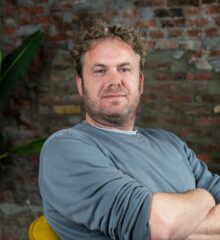
Meet the masters: Samuel Bruyneel, Lunanime
Co-productionThe Flemish Masters were centre-stage at TV Drama Vision, the international conference and marketplace for drama series at the Göteborg Film Festival in January 2024.
Speakers from across the sector reflected on the region’s rich creative talent, and outlined the contribution Flanders can make to international co-productions, both on-screen and behind the scenes.
Producer Samuel Bruyneel of Lunanime (part of Lumière) is no stranger to Göteborg and the Nordic scene more broadly. His company has a long history of distributing and co-producing films and series from the region, such as State of Happiness, Bullets and Occupied.
The Nordic region has focused on very high-quality productions, so stepping in as a co-producer has provided a lot of benefit for our region as well. There has been a cross-pollination in terms of knowhow, and we have learned a lot from each other.

Many kinds of co-production
These partnerships often begin by looking at post-production, since this is an easy way of investing in Belgium and so unlocking the country’s co-financing opportunities. “But there are multiple possibilities, and we tailor-make each production,” Bruyneel said. That can mean establishing shoots in Flanders, or sending crew and equipment abroad.
“In the first place we look at the scripts to see if it matches our DNA. Then we discuss how involved we are going to be in the editorial process, and that depends on the lead producer,” he went on. Sometimes Lumière is fully involved, possibly bringing on board a Flemish writer, or it can step back and simply work on building the production.
But if a project really lines up with its interests, for instance in the crime genre, it can also step in and offer a minimum guarantee for distribution in the Benelux countries.
A minimum guarantee, together with the Tax Shelter and a contribution from Screen Flanders or another economic fund, means that the financing we bring to a co-production can be the equivalent of a much larger territory.

Lumière’s own projects also tend to have an international dimension, taking advantage of the company’s networks abroad. “We have a slight preference for high-end series, and that can be hard to achieve with domestic financing alone,” Bruyneel said. “So, we tend to look for a larger territory to include in the co-financing, and that helps us reach that higher quality and have more international potential.”

Success stories
Lees alle succesverhalenKöln 75: making music history
Co-production
The Polar Bear Prince: combining animation talent
Animation
Mr. K: building a world in the studio
Co-production
Subscribe to our newsletter
Sign up for our newsletter and stay up to date with Screen Flanders news!